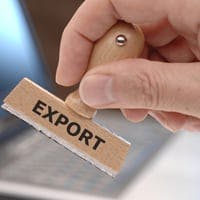We asked some experts to share their views on things first time exporters need to consider and what they often forget.
Rachel Galli, campaign and communications manager, Maersk Line
Q. What are the most important things the first time or would-be exporter should consider?
Take some time to really think about what will drive your export success and don’t underestimate the power your export suppliers have in impacting your success. The more you understand what is truly important to you and your customer the easier it will be for you to choose suppliers who can help you make this happen. For example, if getting repeat orders from a customer relies on your product always arriving on time, ask prospective transport service providers to provide you with their on time delivery statistics and take these into account when choosing who to use. If your product and marketing campaign have a strong environmentally friendly message, consider how the brand image of your suppliers might help or hinder your own environmental image.
Q. What are the common mistakes new exporters make or the things they don’t think about?
Exporters can often get so caught up in the marketing of their product that it can be easy to forget the basics about exporting product. Make sure you know what documentation is required both to export your goods and to import them into the destination country. It is important that you check for any changes in regulations as well because many countries, in particular in Asia, are becoming increasingly strict with controls on imported products as growing middle classes demand higher quality. Services like Austrade are a great place to get help understanding what you need to know about exporting your product to different countries.
Q. Is exporting still a great way to grow your small business?
Yes! Growth of the Asian middle class consumer market for example is increasingly opening new opportunities, from food and wine to niche manufacturing. This is a market that is not only increasing the number of consumers but how much they have to spend on imported goods and as such can be a very profitable market to tap into for Australian exporters with the right product. Our proximity to Asia means that Australian exporters will have relatively low transportation costs compared to potential competitors from Europe or America so these growing markets present a great opportunity to diversify our exports.
Denise Hung, marketing manager, Atradius Credit Insurance
Q: What are the most important things the first time or would-be exporter should consider?
- Understand your market: the first step in risk mitigation is to get to know your target market. What is the export country’s economic and political stability? What is their business culture?
- Investigate potential customers: check the credit history and current business information on potential trading partners.
- Have strict credit management and collection procedures in place: this provides a consistent guideline to manage receivables including the collection process and response to non-payment.
- Protect your cashflow: consider taking credit insurance to protect your business against non-payment.
Q: What are the most common mistakes new exporters make or the things they don’t think about?
- Knock-on effect: be aware of who your customer’s buyers are – if they can’t pay your customer, your customer may not be able to pay you.
- Don’t rush: we find that new exporters sometimes get into trouble by rushing into a market and not spending time to do their research and understand the new market.
We asked some experts to share their views on things first time exporters need to consider and what they often forget.
Anthony Lynch, general manager, Couriersandfreight.com.au
Q: Is exporting still a great way to grow your small business?
Yes. Getting the right balance between domestic and international trade can protect your business if there’s a downturn in one of your markets. You will also come across new ideas and marketing techniques when trading internationally.
Q: What are the most important things the first time or would-be exporter should consider?
Cost management is a vital consideration for any successful exporter. In particular, it is very important to examine the cost of transporting goods. First time exporters need to source rates from reputable freight companies and compare their services based on the size and volume of parcels, as well as the destination and frequency of intended shipments.
If an exporter plans to sell directly to a customer, via a distributor or a retailer, it’s important to obtain quotes for both regular and one-off shipments. Certain carriers specialise in specific services and destinations, and can often have hidden charges. Comparing providers can be a time consuming process, and reviewing the terms and conditions of each can be challenging and confusing.
Q: What are the most common mistakes new exporters make or the things they don’t think about?
It’s important that new exporters invest in transport insurance and rely on a credible provider who specialises in the export industry. Ideally, they should choose a provider that offers risk advice and tailored solutions. Freight insurance covers a range of goods transported across land, air and water.
Q: Is exporting still a great way to grow your small business?
Exporting is a very viable and profitable opportunity once a small business has determined if its products are suitable for international markets. It’s important that an exporter undergo a cost/benefit analysis and tap into new and inventive channels for reducing transportation costs.

